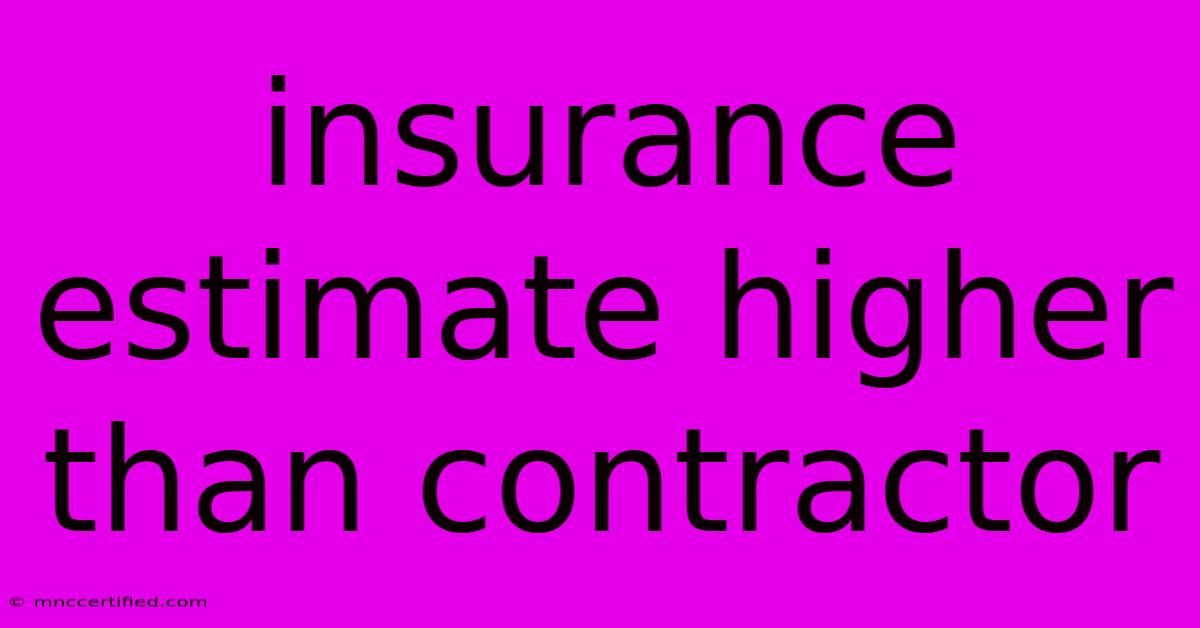Insurance Estimate Higher Than Contractor

Table of Contents
Why Your Insurance Estimate is Higher Than Your Contractor's Quote: A Breakdown
It's a frustrating situation: you file a claim after a storm damages your roof, only to receive an insurance estimate that's significantly higher than the contractor's quote. You're left wondering, "Who's right?" and "How can I get the most out of my insurance claim?"
This discrepancy is more common than you might think. Here's a breakdown of the reasons why your insurance estimate might be higher than a contractor's quote, and how to navigate this tricky situation:
The Insurance Company's Perspective
Insurance companies aim to ensure fair compensation for repairs while protecting themselves from inflated claims. They use their own network of adjusters and estimators who adhere to industry-standard pricing guidelines.
Here's how insurance companies calculate their estimates:
- Replacement Cost Value (RCV): This considers the cost of replacing damaged items with new, similar ones. It often includes labor, materials, and permits.
- Actual Cash Value (ACV): This accounts for depreciation, meaning the value of the item decreases over time. It's typically lower than the RCV.
- Deductible: This is the fixed amount you pay out-of-pocket before insurance kicks in.
Important Considerations:
- Different Scope of Work: Insurance estimates may include replacing entire sections of the roof, while a contractor may focus on specific damaged areas.
- Higher-Quality Materials: Insurers might use higher-quality materials in their estimates, leading to a higher price tag.
- Overhead and Profit: Insurance companies factor in overhead costs and profit margins for contractors, while individual contractors may have different pricing structures.
The Contractor's Perspective
Contractors aim to provide a fair and competitive quote, reflecting their labor and materials costs, and taking into account the specific needs of your repair.
Factors that can affect contractor quotes:
- Local Market Costs: Labor and materials prices vary depending on your location.
- Expertise and Reputation: Contractors with specialized skills or a good reputation might charge higher rates.
- Negotiation and Project Scope: The final price can be influenced by negotiation and the specific details of the repair project.
Bridging the Gap
Here's how to approach the situation when your insurance estimate exceeds your contractor's quote:
- Communicate with your Insurance Company: Provide your contractor's estimate and explain any differences in scope or materials. Ask for a breakdown of the insurance estimate to identify specific items contributing to the discrepancy.
- Negotiate with the Contractor: Discuss the differences in pricing and explore options like using more cost-effective materials or streamlining the project scope.
- Consider an Independent Estimator: An independent estimator can provide an unbiased assessment of the repair costs, offering you a neutral perspective.
- Work with Your Agent: Your insurance agent can act as a liaison between you and the insurance company, advocating for a fair settlement.
Tips for Avoiding Discrepancies
- Choose a Reputable Contractor: Select a contractor with a good track record and get multiple quotes for comparison.
- Understand Your Policy: Familiarize yourself with your insurance policy's coverage limits and deductibles.
- Document the Damage: Take detailed photos and videos of the damage before repairs begin.
Conclusion
Navigating insurance claims can be complex, especially when there are discrepancies between estimates. By understanding the factors influencing both insurance estimates and contractor quotes, you can effectively communicate with both parties to achieve a fair resolution. Open communication, documentation, and a willingness to negotiate can help ensure you receive the compensation you need to rebuild your property.

Thank you for visiting our website wich cover about Insurance Estimate Higher Than Contractor. We hope the information provided has been useful to you. Feel free to contact us if you have any questions or need further assistance. See you next time and dont miss to bookmark.
Featured Posts
-
Mark Robins Out As Coventry City Manager
Nov 07, 2024
-
Where To Watch Warriors Celtics Nba Free
Nov 07, 2024
-
Blue Cross Blue Shield Accident Insurance
Nov 07, 2024
-
Chapman Insurance Group Port Charlotte Fl
Nov 07, 2024
-
Bitcoin Price Real Time Indicator During Economic Uncertainty
Nov 07, 2024